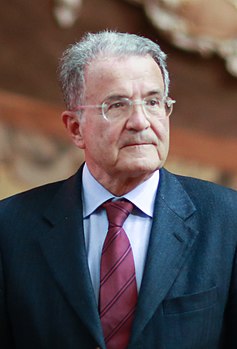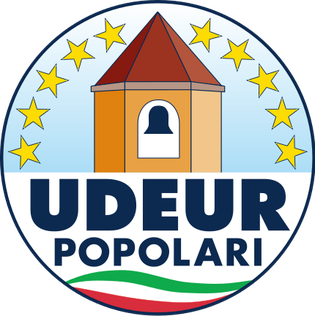Italian regional elections, 2005
|
|
Presidents and regional assemblies of Piedmont, Lombardy, Veneto, Liguria, Emilia-Romagna, Tuscany, Marche, Umbria, Lazio, Campania, Abruzzo, Apulia, Basilicata and Calabria |
|---|
|
 Elected Presidents: The House of Freedoms The Union |
The Italian regional elections of 3–4 April 2005 were a major victory (11-2) for the centre-left The Union coalition, led by Romano Prodi. The centre-right coalition, governing in the national government, was defeated in all the regions it held, except for its strongholds in Lombardy and Veneto, whose population is anyway a fourth of Italian population. The elections resulted in the national government, led by Silvio Berlusconi, to acknowledge defeat and open a crisis, which resulted in the formation of Berlusconi III Cabinet, with some ministers being substituted.

Romano Prodi is an Italian politician who served as the 10th President of the European Commission from 1999 to 2004. He served twice as Prime Minister of Italy, first from 17 May 1996 to 21 October 1998 and then from 17 May 2006 to 8 May 2008. He is considered the founder of the Italian centre-left and one of the most prominent and iconic figures of the so-called Second Republic. Prodi is often nicknamed Il Professore due to his academic career.

Lombardy is one of the twenty administrative regions of Italy, in the northwest of the country, with an area of 23,844 square kilometres (9,206 sq mi). About 10 million people, forming one-sixth of Italy's population, live in Lombardy and about a fifth of Italy's GDP is produced in the region, making it the most populous and richest region in the country and one of the richest regions in Europe. Milan, Lombardy's capital, is the second-largest city and the largest metropolitan area in Italy.

Veneto is one of the 20 regions of Italy. Its population is about five million, ranking fifth in Italy. The region's capital is Venice.
Due to a series of bureaucratic issues involving the presentation of the list of Social Alternative in Basilicata, the election there would have been held two weeks later. There, the victory of the centre-left coalition brought the tally to 12-2.

Social Alternative was a coalition of far-right political parties in Italy.

Basilicata, also known by its ancient name Lucania, is a region in Southern Italy, bordering on Campania to the west, Apulia (Puglia) to the north and east, and Calabria to the south. It also has two coastlines: a 30-km stretch on the Tyrrhenian Sea between Campania and Calabria, and a longer coastline along the Gulf of Taranto between Calabria and Apulia. The region can be thought of as the "instep" of Italy, with Calabria functioning as the "toe" and Apulia the "heel". The region covers about 10,000 km2 (3,900 sq mi) and in 2010 had a population slightly under 600,000. The regional capital is Potenza. The region is divided into two provinces: Potenza and Matera.
The fact that the centre-left was particularly strong in small regions led to the even result of the 2006 general election.

The House of Freedoms, was a major centre-right political and electoral alliance in Italy, led by Silvio Berlusconi.
The regions of Italy are the first-level administrative divisions of Italy, constituting its second NUTS administrative level. There are 20 regions, of which five are constitutionally given a broader amount of autonomy granted by special statutes.

Elections to the European Parliament were held in Italy on 12 and 13 June 2004.

The Union of the Centre, whose complete name is Union of Christian and Centre Democrats, is a Christian democratic political party in Italy. Lorenzo Cesa is the party's current secretary; Pier Ferdinando Casini was for years the most recognisable figure and de facto leader of the party, before eventually distancing from it in 2016. The UdC is a member of the European People's Party (EPP) and the Centrist Democrat International (CDI), of which Casini was president from 2004 to 2015.

After World War II and the overthrow of Mussolini's fascist regime, Italy's history was dominated by the Christian Democracy political party for 48 years—from the 1946 election until the 1994 election—while the opposition was led by the Italian Communist Party (PCI).

The 2006 Italian general election for the two Chambers of the Italian Parliament was held on 9 and 10 April 2006. Romano Prodi, leader of the centre-left coalition The Union, narrowly defeated the incumbent Prime Minister Silvio Berlusconi, leader of the centre-right coalition House of Freedoms.

The Union was an heterogenous centre-left political and electoral alliance of political parties in Italy. The Union was the direct heir of The Olive Tree coalition which represented the centre-left in the 1996 and 2001 general elections. However, The Union also included parties of the radical left, which were not affiliated with The Olive Tree. The Union was led by Romano Prodi, Prime Minister of Italy from April 2006 to April 2008, and former President of the European Commission. Collapsing in the wake of the 2008 Italian political crisis, the alliance was succeeded by the current-day centre-left coalition.

A snap national general election was held in Italy on 21 April 1996 to elect members of the Chamber of Deputies and the Senate of the Republic. Romano Prodi, leader of the centre-left coalition The Olive Tree, won the election, narrowly defeating Silvio Berlusconi, who led the Pole for Freedoms centre-right coalition.

Angelino Alfano is an Italian politician served as Minister of Foreign Affairs from 12 December 2016 to 1 June 2018.

A snap national general election was held in Italy on 27 March 1994 to elect members of the Chamber of Deputies and the Senate. Silvio Berlusconi's centre-right alliance won a large majority in the Chamber, but just missed winning a majority in the Senate. The Italian People's Party, the renamed Christian Democrats, which had dominated Italian politics for almost half a century, was decimated. It took only 29 seats versus 206 for the DC two years earlier-easily the worst defeat a sitting government in Italy has ever suffered, and one of the worst ever suffered by a Western European governing party.

The Berlusconi III Cabinet was the cabinet of the government of Italy from 23 April 2005 to 17 May 2006. It was the 58th cabinet of the Italian Republic, and the second cabinet of the XIV Legislature.

A snap general election was held in Italy on 13–14 April 2008. The election came after President Giorgio Napolitano dissolved Parliament on 6 February 2008, following the defeat of the government of Prime Minister Romano Prodi in a January 2008 Senate vote of confidence and the unsuccessful tentative appointment of Franco Marini with the aim to change the current electoral law. Under Italian law, elections must be held within 70 days of the dissolution. The voting determined the leader of Italy's 62nd government since the end of World War II. The coalition led by ex-Prime Minister Silvio Berlusconi from The People of Freedom party defeated that of former Mayor of Rome, Walter Veltroni of the Democratic Party.

The Berlusconi I Cabinet was the 51st cabinet of the Italian Republic. It held office from 11 May until 22 December 1994.

The Berlusconi II Cabinet was the 57th cabinet of the Italian Republic and the first cabinet of the XIV Legislature. It took office following the 2001 elections, and held office from 11 June 2001 until 23 April 2005, a total of 1,412 days, or 3 years, 10 months and 12 days. It held office for the longest period in the history of the Republic, and for the second longest period in the history of unified Italy since 1861. During its long tenure, its composition changed significantly. Following the poor performance of the centrist parties in the Italian regional elections of 2005, most of the ministers of the Union of Christian and Centre Democrats and the New PSI resigned from the government, which was succeeded by the Berlusconi III Cabinet.

A large round of regional elections in Italy took place on 28–29 March in 13 regions out of 20, including nine of the ten largest ones: Lombardy, Campania, Veneto, Lazio, Piedmont, Emilia-Romagna, Apulia, Tuscany and Calabria.

The political career of Silvio Berlusconi began in 1994, when Berlusconi entered politics for the first time serving intermittent terms as Prime Minister of Italy from 1994 to 1995, 2001 to 2006 and 2008 to 2011, his career was racked with controversies and trials; amongst these was his failure to honour his promise to sell his personal assets in Mediaset, the largest television broadcaster network in Italy, in order to dispel any perceived conflicts of interest.

The Union of Democrats for Europe, also known as UDEUR Populars, was a minor centrist and Christian-democratic political party in Italy.
The centre-right coalition is a political alliance of political parties in Italy, active—under several forms and names—since 1994, when Silvio Berlusconi entered politics and formed his Forza Italia party.
The centre-left coalition is a political alliance of political parties in Italy active, under several forms and names, since 1995 when The Olive Tree was formed under the leadership of Romano Prodi. The centre-left coalition ruled the country for more than twelve years between 1996 and 2018.

The Italian regional elections of 16 April 2000 were won by the House of Freedoms coalition, led by Silvio Berlusconi.



















